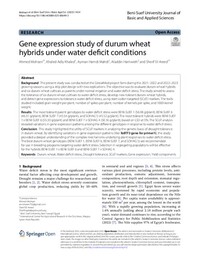Gene expression study of durum wheat hybrids under water deficit conditions

Authors:
Background
The present study was conducted at the CerealMed project farm during the 2021–2022 and 2022–2023 growing seasons using a strip plot design with two replications. The objective was to evaluate durum wheat hybrids and six durum wheat cultivars as parents under normal irrigation and water deficit stress. The study aimed to assess the tolerance of six durum wheat cultivars to water deficit stress, develop new tolerant durum wheat hybrids, and detect gene expressions to tolerance water deficit stress, using start codon-targeted (SCoT) markers. The traits studied included grain weight per plant, number of spikes per plant, number of kernels per spike, and 1000-kernel weight.
Results
The most tolerant parent genotypes to water deficit stress were BENI-SUEF 1 (56.98 g/plant), BENI-SUEF 6 (46.31 g/plant), BENI-SUEF 7 (45.54 g/plant), and SOHAG 5 (45.52 g/plant). The most tolerant hybrids were BENI-SUEF 1 × BENI-SUEF 6 (55.33 g/plant) and BENI-SUEF 7 × SOHAG 4 (50.16 g/plant), based on LSD at 5%. The SCoT analysis revealed variations in gene expression patterns among the different genotypes in response to water deficit stress.
Conclusion
This study highlighted the utility of SCoT markers in analyzing the genetic basis of drought tolerance in durum wheat. By identifying variations in gene expression patterns (like TaBTF3 gene for primer1), the study provided a deeper understanding of the complex mechanisms underlying plant responses to water deficit stress. The best durum wheat genotypes (BENI-SUEF 1, BENI-SUEF 6, BENI-SUEF 7, and SOHAG 5) are recommended for use in breeding programs targeting water deficit stress. Selection in segregating populations will be effective for the hybrids BENI-SUEF 1 × BENI-SUEF 6 and BENI-SUEF 7 × SOHAG 4.
